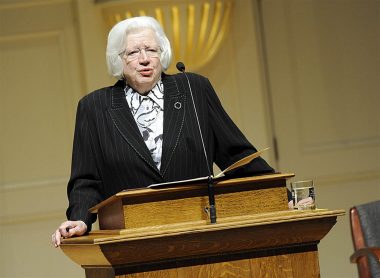Academic leader and celebrated scholar Hanna Holborn Gray discussed the historical evolution of universities and the role of foundational liberal arts studies in the annual James P. Elder lecture on April 16.

Gray’s lecture, titled “Education and Utopia,” focused on the pervasive historical disagreement regarding the role of liberal arts education, not only in reference to the university system and professional development, but also in the greater context of its contribution to society.
Gray is a historian with special interests in humanism, political thought, and politics in the Renaissance and the Reformation. A Fulbright scholar with a doctorate from Harvard, she served as provost at Yale University (1974-78), acting president at Yale (1977-78) and was the first female president of a major co-educational university, leading the University of Chicago from 1978 to 1993. She is a Presidential Medal of Freedom honoree, has served on numerous nonprofit and corporate boards, and holds more than 60 honorary degrees from universities throughout the United States, Britain and Canada.
Beginning with Thomas Moore’s “Utopia,” and ending in this century with the opinions of Robert Maynard Hutchins of the University of Chicago, Gray traced the arguments between those who sought to revolutionize education and those who rooted themselves in tradition.
There are those, like Moore, Gray explained, who saw a liberal arts education as being one that encourages the freedom of the mind through questions and examination. These individuals stood in contention to those whose views included a more traditional definition of scholarship, through the mastery of the historical humanities, forsaking the sciences and elective system of education.
The balance and assessment of these viewpoints is the constant challenge for a liberal arts institution, said Gray. But to look at it historically is to provide a critical eye for the future.
Quoting Irving Howe at the end of her lecture, Gray said, “The past is the substance from which the present has been formed.”
The history of the James P. Elder lecture series was recognized in an introduction by former Elon trustee Robert Lane ’71, who acknowledged the presence of a number of James Elder’s former students. The lecture series, which bears Elder’s name, is the only endowed lecture series at Elon University. It is devoted to the exploration of critical scholarship and its impact on the public forum.
– Story by Bethany Swanson ’09


